Fiat Tipo Wagon vs Kia Stonic – Performance, range & efficiency compared
Both models have their strengths – but which one suits you more?
Compare performance, efficiency, price and space directly: Fiat Tipo Wagon or Kia Stonic?
Costs and Efficiency:
Looking at overall running costs, both models reveal some interesting differences in everyday economy.
Kia Stonic has a barely noticeable advantage in terms of price – it starts at 19400 £, while the Fiat Tipo Wagon costs 21000 £. That’s a price difference of around 1543 £.
Fuel consumption also shows a difference: Fiat Tipo Wagon manages with 4.70 L and is therefore a bit more efficient than the Kia Stonic with 5.50 L. The difference is about 0.80 L per 100 km.
Engine and Performance:
Under the bonnet, it becomes clear which model is tuned for sportiness and which one takes the lead when you hit the accelerator.
When it comes to engine power, the Fiat Tipo Wagon has a clearly perceptible edge – offering 130 HP compared to 100 HP. That’s roughly 30 HP more horsepower.
In acceleration from 0 to 100 km/h, the Fiat Tipo Wagon is clearly perceptible quicker – completing the sprint in 9.10 s, while the Kia Stonic takes 11.30 s. That’s about 2.20 s faster.
In terms of top speed, the Fiat Tipo Wagon performs slightly better – reaching 207 km/h, while the Kia Stonic tops out at 179 km/h. The difference is around 28 km/h.
There’s also a difference in torque: Fiat Tipo Wagon pulls distinct stronger with 320 Nm compared to 200 Nm. That’s about 120 Nm difference.
Space and Everyday Use:
Cabin size, boot volume and payload all play a role in everyday practicality. Here, comfort and flexibility make the difference.
Both vehicles offer seating for 5 people.
In curb weight, Kia Stonic is noticeable lighter – 1195 kg compared to 1455 kg. The difference is around 260 kg.
In terms of boot space, the Fiat Tipo Wagon offers distinct more room – 550 L compared to 352 L. That’s a difference of about 198 L.
When it comes to payload, Fiat Tipo Wagon hardly perceptible takes the win – 475 kg compared to 455 kg. That’s a difference of about 20 kg.
Who comes out on top?
Overall, the Fiat Tipo Wagon shows itself to be wins the duel decisively and secures the title of DriveDuel Champion.
It convinces with the more balanced overall package and proves to be the more versatile choice for everyday use.
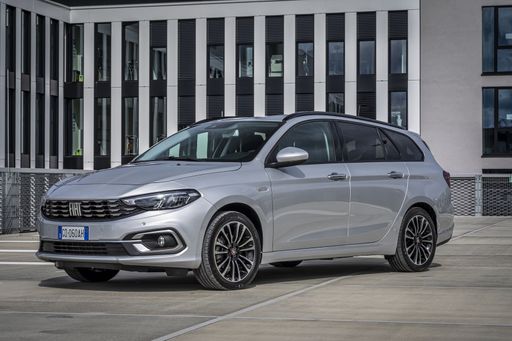
Fiat Tipo Wagon
Fiat Tipo Wagon
The Fiat Tipo Station Wagon offers a spacious and practical solution for families seeking value without sacrificing comfort. Its sleek design and modern interior features create a pleasant driving experience, complemented by a range of user-friendly technology. On the road, the Tipo Estate provides a smooth drive, making it an ideal companion for both urban and longer journeys.
details @ media.stellantis.com
@ media.stellantis.com
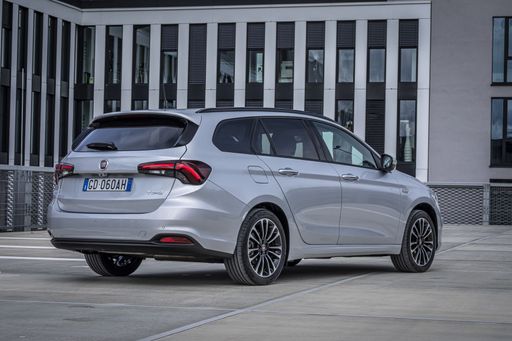 @ media.stellantis.com
@ media.stellantis.com
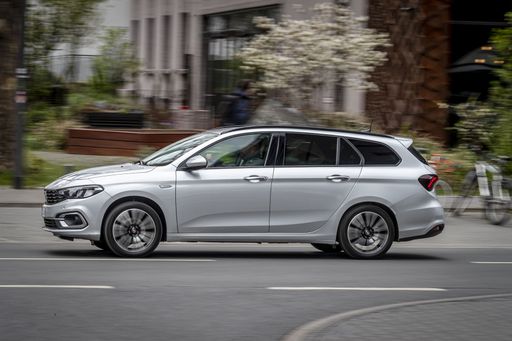 @ media.stellantis.com
@ media.stellantis.com
Kia Stonic
The Kia Stonic is a compact crossover that seamlessly blends bold design with practical functionality. Its distinctive, eye-catching exterior is complemented by a well-crafted interior offering a comfortable ride and intuitive technology for today's drivers. The Stonic is perfect for urban environments, providing agility and efficiency without compromising on style or performance.
details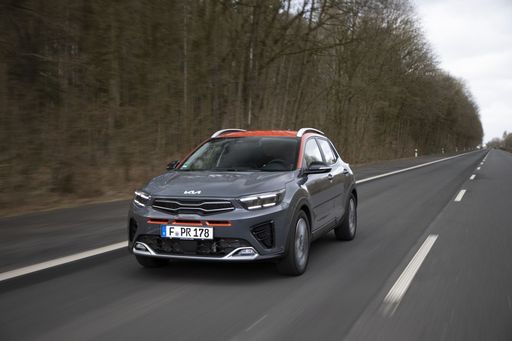 @ press.kia.com
@ press.kia.com
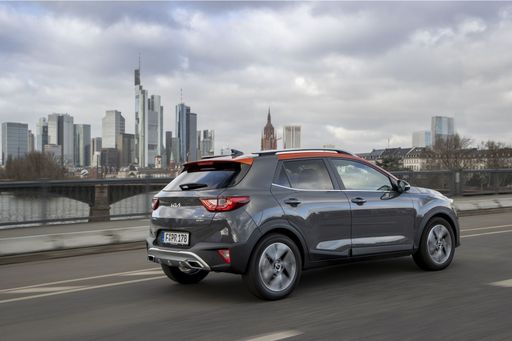 @ press.kia.com
@ press.kia.com
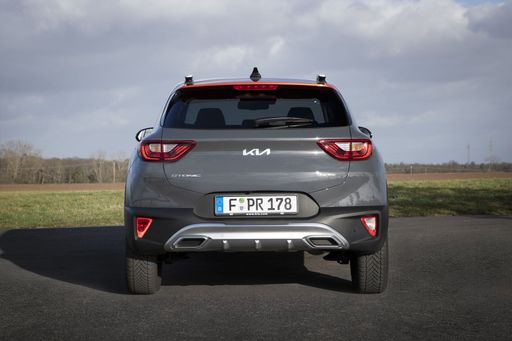 @ press.kia.com
@ press.kia.com
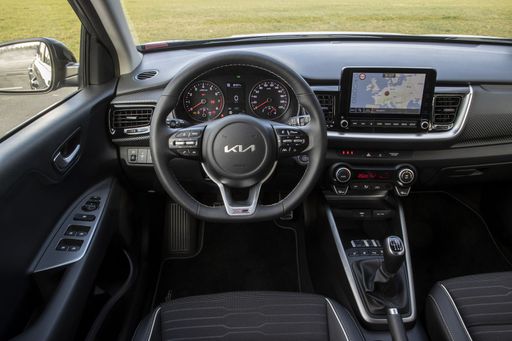 @ press.kia.com
@ press.kia.com
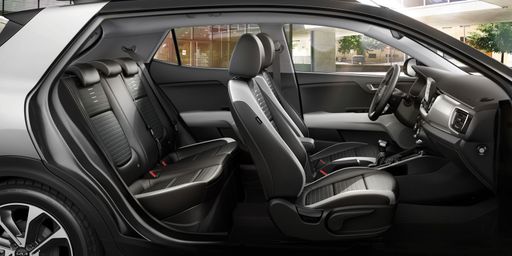 @ press.kia.com
@ press.kia.com

|

|
|
|
|
Costs and Consumption |
|
|---|---|
|
Price
21000 - 27000 £
|
Price
19400 - 25600 £
|
|
Consumption L/100km
4.7 - 5.4 L
|
Consumption L/100km
5.5 - 5.7 L
|
|
Consumption kWh/100km
-
|
Consumption kWh/100km
-
|
|
Electric Range
-
|
Electric Range
-
|
|
Battery Capacity
-
|
Battery Capacity
-
|
|
co2
122 - 125 g/km
|
co2
125 - 129 g/km
|
|
Fuel tank capacity
50 L
|
Fuel tank capacity
45 L
|
Dimensions and Body |
|
|---|---|
|
Body Type
Estate
|
Body Type
SUV
|
|
Seats
5
|
Seats
5
|
|
Doors
5
|
Doors
5
|
|
Curb weight
1455 - 1470 kg
|
Curb weight
1195 - 1260 kg
|
|
Trunk capacity
550 L
|
Trunk capacity
352 L
|
|
Length
4571 mm
|
Length
4140 mm
|
|
Width
1792 mm
|
Width
1760 mm
|
|
Height
1514 mm
|
Height
1505 mm
|
|
Max trunk capacity
-
|
Max trunk capacity
1155 L
|
|
Payload
475 kg
|
Payload
450 - 455 kg
|
Engine and Performance |
|
|---|---|
|
Engine Type
Petrol MHEV, Diesel
|
Engine Type
Petrol, Petrol MHEV
|
|
Transmission
Automatic, Manuel
|
Transmission
Manuel, Automatic
|
|
Transmission Detail
Dual-Clutch Automatic, Manual Gearbox
|
Transmission Detail
Manual Gearbox, Dual-Clutch Automatic
|
|
Drive Type
Front-Wheel Drive
|
Drive Type
Front-Wheel Drive
|
|
Power HP
130 HP
|
Power HP
100 HP
|
|
Acceleration 0-100km/h
9.1 - 10.1 s
|
Acceleration 0-100km/h
11.3 - 12.4 s
|
|
Max Speed
206 - 207 km/h
|
Max Speed
176 - 179 km/h
|
|
Torque
240 - 320 Nm
|
Torque
172 - 200 Nm
|
|
Number of Cylinders
4
|
Number of Cylinders
3
|
|
Power kW
96 kW
|
Power kW
74 kW
|
|
Engine capacity
1469 - 1598 cm3
|
Engine capacity
998 cm3
|
General |
|
|---|---|
|
Model Year
2024
|
Model Year
2024 - 2025
|
|
CO2 Efficiency Class
D
|
CO2 Efficiency Class
D
|
|
Brand
Fiat
|
Brand
Kia
|
What drivetrain options does the Fiat Tipo Wagon have?
Available configurations include Front-Wheel Drive.
The prices and data displayed are estimates based on German list prices and may vary by country. This information is not legally binding.
